
ghvknkb
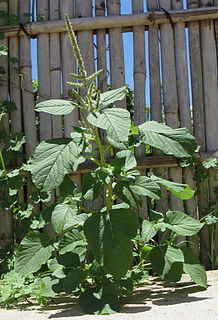
Amaranthus blitum, commonly called purple amaranth or Guernsey pigweed, is an annual plant species in the economically important plant family Amaranthaceae.
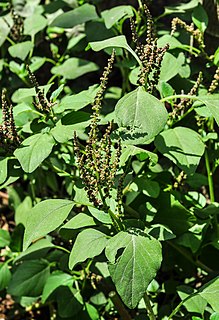
Amaranthus viridis is a cosmopolitan species in the botanical family Amaranthaceae and is commonly known as slender amaranth or green amaranth.

Amaranthus hybridus, commonly called green amaranth, slim amaranth, smooth amaranth, smooth pigweed, or red amaranth, is a species of annual flowering plant. It is a weedy species found now over much of North America and introduced into Europe and Eurasia.

Amaranthus caudatus is a species of annual flowering plant. It goes by common names such as love-lies-bleeding, pendant amaranth, tassel flower, velvet flower, foxtail amaranth, and quilete.

Amaranthus hypochondriacus is an ornamental plant commonly known as Prince-of-Wales feather or prince's-feather. Originally endemic to Mexico, it is called quelite, blero and quintonil in Spanish.
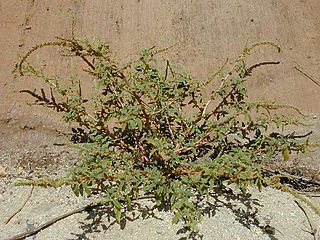
Amaranthus spinosus, commonly known as the spiny amaranth, spiny pigweed, prickly amaranth or thorny amaranth, is a plant is native to the tropical Americas, but is present on most continents as an introduced species and sometimes a noxious weed. It can be a serious weed of rice cultivation in Asia.

Amaranthus retroflexus is a species of flowering plant in the family Amaranthaceae with several common names, including red-root amaranth, redroot pigweed, red-rooted pigweed, common amaranth, pigweed amaranth, and common tumbleweed.

Amaranthus tricolor, known as edible amaranth, is a species of flowering plant in the genus Amaranthus, part of the family Amaranthaceae.
Amaranthus thunbergii, commonly known as Thunberg's amaranthus or Thunberg's pigweed, is found in Africa.
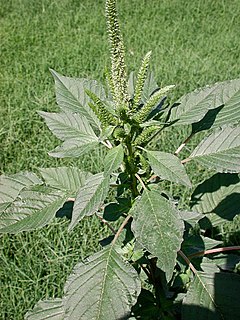
Amaranthus palmeri is a species of edible flowering plant in the amaranth genus. It has several common names, including carelessweed, dioecious amaranth, Palmer's amaranth, Palmer amaranth, and Palmer's pigweed. It is native to most of the southern half of North America. Populations in the eastern United States are probably naturalized. It has also been introduced to Europe, Australia, and other areas. The plant is fast-growing and highly competitive.

Amaranthus dubius, the red spinach, Chinese spinach,, spleen amaranth, hon-toi-moi, yin choy, hsien tsai, or Arai keerai is a plant species. It belongs to the economically important family Amaranthaceae.

Amaranthus cruentus is a flowering plant species that yields the nutritious staple amaranth grain. It is one of three Amaranthus species cultivated as a grain source, the other two being Amaranthus hypochondriacus and Amaranthus caudatus. In Mexico, it is called huautli (Spanish pronunciation: [ˈwawtli] and alegría ([aleˈɣɾi.a] and in English it has several common names, including blood amaranth, red amaranth, purple amaranth, prince's feather, and Mexican grain amaranth. In Maharashtra, it is called shravani maath or rajgira. In Kerala, it is called chuvanna cheera or commonly, cheera.

Species belonging to the genus Amaranthus have been cultivated for their grains for 8,000 years. Amaranth plants are classified as pseudocereals that are grown for their edible starchy seeds, but they are not in the same botanical family as true cereals, such as wheat and rice. Amaranth species that are still used as a grain are Amaranthus caudatus L., Amaranthus cruentus L., and Amaranthus hypochondriacus L. The yield of grain amaranth is comparable to rice or maize.

Amaranthus blitoides, commonly called mat amaranth, prostrate pigweed, procumbent pigweed, prostrate amaranth, or matweed, is a glabrous annual plants species. It usually grows up to 0.6 m, though it may grow up to 1 m. It flowers in the summer to fall.
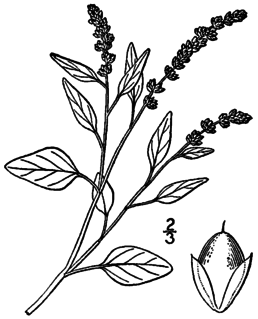
Amaranthus deflexus is also known by the common names low amaranth, Argentina amaranth, perennial pigweed, and large-fruit amaranth. It is native to South America, and has been introduced to many other parts of the world. It is a short-lived perennial or annual plant. The plant can grow up to 1.5 ft in height.

Amaranthus graecizans, the Mediterranean amaranth or short-tepalled pigweed, is an annual species in the botanical family Amaranthaceae. It is native to Africa, southern Europe, East Asia to India and Central Asia. It is naturalized in North America. More general common names include tumbleweed and pigweed.

Amaranthus tuberculatus, commonly known as roughfruit amaranth, rough-fruited water-hemp, tall waterhemp, or common waterhemp, is a species of flowering plant. It is a summer annual broadleaf with a germination period that lasts several months. Tall waterhemp has been reported as a weed in 40 of 50 U.S. states.
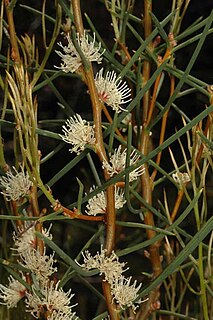
Hakea mitchellii, commonly known as desert hakea, is a shrub species in the family Proteaceae.
Amaranthus grandiflorus is a species of Amaranthus found in Australia.

















